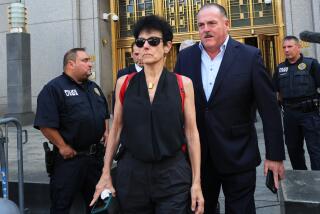Defendants Formally Deny Carl’s Jr. Insider Trading
- Share via
Carl’s Jr. restaurant founder Carl N. Karcher, members of his family and a company employee Wednesday formally denied accusations of illegal insider stock trading.
In documents filed in U.S. District Court in Los Angeles, many of the defendants contended that the Securities and Exchange Commission violated its own guidelines in filing the civil action and challenged the authority of SEC to file the lawsuit at all.
The documents mark the first in-court response by the 71-year-old company founder, 14 family members and one company employee accused of insider trading in a civil suit filed by the SEC last month.
The SEC alleges that Karcher and his brother, Donald Karcher, and their wives tipped some of their relatives to news about falling profits at Anaheim-based Karcher Enterprises in 1984.
According to the action, which seeks more than $1 million from the defendants, Karcher relatives sold stock based on inside information passed along in a series of conversations, allowing them to avoid potential losses of at least $310,000. The suit does not contend that Carl and Donald Karcher or their wives sold any stock.
All of the defendants denied any wrongdoing.
Papers filed for Karcher and his wife by the Los Angeles law firm of Gibson, Dunn & Crutcher state that “throughout 1984 (the Karchers) talked about (company) business from time to time and . . . they had contact with all of their children, including those named as defendants.”
But the document states repeatedly that Carl and Margaret Karcher “did not improperly or unlawfully transmit or communicate material, non-public information.”
Documents filed on behalf of seven other Karcher family members acknowledged that they talked to one another and had telephone conversations, but they denied doing anything illegal.
“My clients didn’t receive any insider information, they have not used any inside information in trading, they’re completely innocent, and they’ll be vindicated at trial,” Orville A. Armstrong, the attorney representing seven Karcher relatives, said in an interview.
Other legal arguments cited by defendants include:
That the SEC violated its own rules, practices and policies in bringing the lawsuit. Papers filed by Carl Karcher, for example, state that he “was not notified of all of his claimed . . . violations” during the investigation and that the government misrepresented the claims being considered.
That the SEC waited too long to bring its civil action. According to the Karcher documents, the SEC filed its lawsuit 18 months after it claimed to have completed its factual investigation.
That the SEC does not have the authority to bring the civil action.
This defense, raised by several of the defendants, stems from a case pending before the U.S. Supreme Court that challenges the constitutionality of independent counsels who investigate charges of wrongdoing by current and former government officials.
According to defense lawyers in the Karcher case, if the use of special prosecutors is found to be invalid, the same argument could be used to argue that the SEC similarly has no legal authority to file lawsuits.
Attorneys for several defendants also argue that the SEC’s allegations are not legally valid.
“It’s well recognized that a violation of insider trading laws has to be with intent and knowledge,” said Arthur Sherwood, an attorney for Carl Karcher and his wife. “At most, the SEC has alleged that Carl Karcher was negligent. They haven’t stated a proper claim.”
A staff attorney with the SEC, Myrna Morganstern, declined comment Wednesday because she had not yet seen the defense answers.
Now that the answers have been filed, all attorneys in the case will meet within 20 days with U.S. District Judge Edward Rafeedie to discuss progress of the case. After that, a trial could begin in six to seven months, one defense lawyer said.
More to Read
Inside the business of entertainment
The Wide Shot brings you news, analysis and insights on everything from streaming wars to production — and what it all means for the future.
You may occasionally receive promotional content from the Los Angeles Times.










